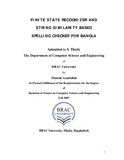| dc.contributor.advisor | Khan, Mumit | |
| dc.contributor.author | Asadullah, Munshi | |
| dc.date.accessioned | 2010-10-10T06:26:09Z | |
| dc.date.available | 2010-10-10T06:26:09Z | |
| dc.date.copyright | 2007 | |
| dc.date.issued | 2007 | |
| dc.identifier.uri | http://hdl.handle.net/10361/416 | |
| dc.description | This thesis report is submitted in partial fulfillment of the requirements for the degree of Bachelor of Science in Computer Science and Engineering, 2007. | en_US |
| dc.description | Cataloged from PDF version of thesis report. | |
| dc.description | Includes bibliographical references (page 44). | |
| dc.description.abstract | A crucial figure of merit for a spelling checker is not just whether it can detect misspelled words,
but also in how it ranks the suggestions for the word. Spelling checker algorithms using edit
distance methods tend to produce a large number of possibilities for misspelled words. We
propose an alternative approach to checking the spelling of Bangla text that uses a finite state
automaton (FSA) to probabilistically create the suggestion list for a misspelled word. FSA has
proven to be an effective method for problems requiring probabilistic solution and high error
tolerance. We start by using a finite state representation for all the words in the Bangla
dictionary; the algorithm then uses the state tables to test a string, and in case of an erroneous
string, try to find all possible solutions by attempting singular and multi-step transitions to
consume one or more characters and using the subsequent characters as look-ahead; and finally,
we use backtracking to add each possible solution to the suggestion list. The use of finite state
representation for the word implies that the algorithm is much more efficient in the case of noninflected
forms; in case of nouns, it is even more significant as Bangla nouns are heavily used in
the non-inflected form. In terms of error detection and correction, the algorithm uses the statistics
of Bangla error pattern and thus produces a small number of significant suggestions. One notable
limitation is the inability to handle transposition errors as a single edit distance errors. This is not
as significant as it may seem since the number of transposition errors are not as common as other
errors in Bangla. This paper presents the structure and the algorithm to implement a Practical
Bangla spell-checker, and discusses the results obtained from the prototype implementation. | en_US |
| dc.description.statementofresponsibility | Munshi Asadullah | |
| dc.format.extent | 44 pages | |
| dc.language.iso | en | |
| dc.publisher | BRAC University | en_US |
| dc.rights | BRAC University thesis are protected by copyright. They may be viewed from this source for any purpose, but reproduction or distribution in any format is prohibited without written permission. | |
| dc.subject | Computer science and engineering | |
| dc.title | Finite state recognizer and string similarity based spelling checker for Bangla | en_US |
| dc.type | Thesis | en_US |
| dc.contributor.department | Department of Computer Science and Engineering, BRAC University | |
| dc.description.degree | B. Computer Science and Engineering | |

